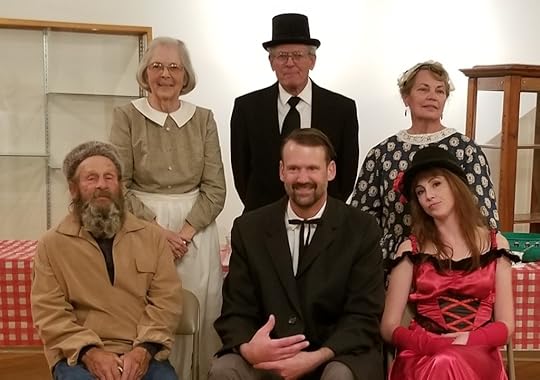Pat Bertram's Blog, page 50
August 27, 2021
Family Lore
I’m reading a book about Roosevelt’s Island in New York. It was named Roosevelt’s Island in 1973. Before that, it was Welfare Island. And before that, it was Blackwell’s Island. Although it has a sad and appalling history as a place to house the unwanted — criminals, sick people, mentally ill folks, people who were lost and didn’t speak enough English to explain where they wanted to go — I have a personal interest because a woman who might be my great-grandmother was once incarcerated there.
According to family lore, our family comes by its insanity naturally — we inherited it. My great-grandfather was a scientist and inventor. He worked with Edison and other renowned scientists of the day, perhaps even Tesla. He invented the postmarking machine and foolishly sold the patent to get funds to invent a subway sweeper that never caught on. The people who supposedly did him a favor by buying the patent, became very rich because that postmarking machine was used continuously until the digital age made it obsolete. This otherwise intelligent man — my grandfather — had been married twice. One wife he threw down the stairs. The other he consigned to the Lunatic Asylum on Blackwell’s Island.
The asylum was supposed to be a state-of-the-art facility, with patients classified as to their illness, rather than all thrown in together, the violent and harmless alike. The Asylum was also supposed to be moral, treating the patients like humans rather than like depraved animals. This humane mental institution never materialized. Instead, the asylum was a dreadful place that journalist Nellie Bly described as a “human rat trap.” Even worse, since convicts from the nearby penitentiary were used as guards and attendants, the patients were “abandoned to the tender mercies of thieves and prostitutes.”
No one knows which of my great-grandfather’s wives is my great-grandmother, but even if she weren’t the one committed (especially since there’s a chance he had her committed for his own reasons rather than her mental state), the insanity could come from dear old great-grandfather himself because there seems to be a portion of insanity in incarcerating one woman and tossing another down the stairs
His son, an embezzler who never quite measured up to his father, went to prison for a while and died an alcoholic at 96.
My father kept himself on a tight rein to keep from turning into his father, which was an imbalance of a different sort, and caused all sorts of problems, especially with his oldest children.
My older brother seemed to have inherited all the family craziness — he was a brilliant inventor and electronic genius at the age of twelve, and then he succumbed to the same devils that had tormented his progenitors.
For all I know, I might have inherited some of these problems, but I have more of the Polish placidity of my mother’s family than the German genius and volatility of my father’s family. And besides, it seems to be a sort of insanity that is passed down from father to son.
Not that any of this makes any difference. All those people are gone now, and nothing can change anything that happened, but I do sometimes think of my great-grandfather and his wives and wonder what happened to the poor woman who was sent to Blackwell’s Island.

***

What if God decided S/He didn’t like how the world turned out, and turned it over to a development company from the planet Xerxes for re-creation? Would you survive? Could you survive?
A fun book for not-so-fun times.
August 26, 2021
Email Update

At the beginning of summer, the email program I got with my website was changed from a free program to a paid one. Even worse, the new email changed from a simple format to Outlook. I already have sold most of my online soul to Microsoft (I use Windows 10, and from what I understand, they practically own my computer). I really didn’t want to change emails because I like the idea of my own personal dot com address, but conversely, I didn’t want to get any more involved with Microsoft products, so I planned to phase out my @patbertram.com email address.
As it turned out, it was way too difficult to make all the changes to all the important sites I’ve signed up for using that email address and luckily, the cost for Outlook wasn’t as much as my domain provider threatened, so I caved in.
Perhaps in a year or two, the unimportant sites will fall by the wayside or I’ll have switched them to a different email, leaving only a handful of important sites that need to be changed.
The good thing about keeping my dot com email address is that I don’t have to contend with ads. The not-so-good thing is that it’s more expensive than ad-free Outlook would be and I have way less storage capacity. But I suppose it’s only fair to pay more for getting to keep my “vanity” address and to postpone having to search out all the sites I might have signed up for using that address.
One way or another, sometime or other, that address will become defunct anyway. My website is paid for way in advance (when I signed up, the domain “rent” was so cheap that I signed up for the maximum of ten years; now all I have to do each year is pay for one year’s renewal to keep that advance). I don’t intend to keep renewing, so I will be phasing out my website in ten years. (Unless, of course, I suddenly become such a big name that the price and aggravation of maintaining a website is worth it.) Which means that the email, assuming I keep it that long, will also become phased out.
But for now, I’m maintaining the status quo.
***

Pat Bertram is the author of Grief: The Inside Story – A Guide to Surviving the Loss of a Loved One. “Grief: The Inside Story is perfect and that is not hyperbole! It is exactly what folk who are grieving need to read.” –Leesa Healy, RN, GDAS GDAT, Emotional/Mental Health Therapist & Educator
August 25, 2021
Dreaming a Garden
After Jeff died, I did many things that ordinarily I wouldn’t have done, such as taking dance classes and joining a hiking club, because I worried that otherwise I’d stagnate, that I’d become the crazy cat lady sans cats, the one who was so alone that she’d be dead a week before anyone ever noticed she was gone.
Even after I moved here, I kept up with socializing, and I did rather well for a year until The Bob came and changed everything. Now I spend most of my time by myself, with only my job, a weekly visit to the library, and a monthly get together with the art guild to take me out of myself.
Perhaps I am on the way to stagnation as I feared, but the one saving grace is my interest in gardening, which means I won’t be the catless cat lady, I’ll be that old lady who is only seen when she is outside working on her garden. There are people around who, I am sure, would make sure I don’t devolve into that woman, but more to the point, there will be the garden.
I’m still such a neophyte that no matter what I do, a percentage of what I plant ends up dead, but that is not discouraging me. In fact, just today, I received a mailer from a plant company for things to plant this fall. Cold hardy hibiscus. Carpet phlox. Oriental poppies. Shade loving astilbe. Even the names are evocative! My ability to keep plants alive in both the burning heat of mid-summer and the bitter cold of mid-winter isn’t what I would like it to be, though I wonder at times if the problem is solely with me and if perhaps the soil, the plants themselves, or the seller share some of the blame. There’s only one company I ever purchased plants from who sent plants that are all still alive a year later. The plants from other companies don’t fare as well; in fact, all but two of the plants I got from a company that specializes in prairie plants never made it through the winter.
Still, I try. It seems to me as if my gardening expertise is a lesson in hope over reality. But I continue to dream anyway. And as long as I can dream, even if it is only dreaming a garden, I won’t stagnate. Oh, I might well become the neighborhood crazy lady, though in my own head and in my own garden, I’ll be active and spirited and very much alive.
One of these days, too, I’ll get back into writing, though I haven’t yet thought of a story or characters I’d be willing to live with for the year or so it will take to write the book.
Meantime, it’s a matter of deciding what plants to order and where to put them.

***

What if God decided S/He didn’t like how the world turned out, and turned it over to a development company from the planet Xerxes for re-creation? Would you survive? Could you survive?
A fun book for not-so-fun times.
Click here to buy Bob, The Right Hand of God
August 24, 2021
Murder Mystery Proposal
I submitted a proposal to the museum today for the murder mystery they’ve planned for the end of October.
The first mystery I created was based on a Clue game, so all the character’s names were colors. Various comments and suggestions from people gave me the idea of bird names. The victims could be a couple surnamed “Crow,” and the event could be called “A Murder of Crows.” Not everyone knows that a group of crows is not a flock but a murder, but that shouldn’t make any difference to the game.
Crows have nothing in particular to do with this area, though this part of Colorado is a good site for birding. (Except when it comes to me. Out of the 400 species that have been sighted, I’ve seen only a dozen or so.) Because of a lack any historical connection to crows, my proposal was just a first draft to get things going. Still, the museum director seemed to like the idea.
One of the characters could be a woman reporter, whose name could be Brenda Starling or more probably, Nellie Starling since Brenda Starr wasn’t created until the forties and Nellie Bly was active during the historical time of this event.
I’d also like one of the victims to be a ghost, roaming around looking for either her husband, their killer, or both.
And there’s a local medicine man who would make a good huckster.
My job is done for a while. The next steps need to come from other people, such as signing up people to play various characters and finding out noteworthy local events from that time. And I need help figuring out the visual clues, though I have a hunch that will be left to me.
I did have visual clues the first time, such as a photo of a man with a saloon girl he claimed never to have met, but since the museum is rather large for such a small town, I think clues like that got lost. This time, I figure we can put a silhouette of a crow by any clue, photographic or otherwise, to give people a hint.
I’d like to use fingerprints somehow. It’s possible I could just put a photo of a fingerprint by the crime scene and then simply tell people who it belonged to, though the person would deny committing the crime. Another possibility is to give all the characters a photo of a fingerprint they can hand out so people can check who the fingerprint belongs to, but the logistics of doing that seem a bit too complicated.
What makes this sort of game hard to create is that it has to be enigmatic yet logical, as do all mysteries. It also needs to be convoluted yet easy enough to solve so that even kids can play.
Until the museum folks gather some of the information I need, I don’t really have to do anything else to put it all together. Except think, of course. It always helps me to play out various scenarios in my head before I lay them out on a page.
A big thank you to everyone who gave me suggestions for this project. It certainly makes it easy for me to come up with a proposal when all I have to do is collate other people’s ideas!

***

Pat Bertram is the author of Grief: The Inside Story – A Guide to Surviving the Loss of a Loved One. “Grief: The Inside Story is perfect and that is not hyperbole! It is exactly what folk who are grieving need to read.” –Leesa Healy, RN, GDAS GDAT, Emotional/Mental Health Therapist & Educator
August 23, 2021
Odd Thoughts
Today is following the pattern of my previous two or three Mondays. I got up, did my knee exercises, made my bed, folded my quota of origami cranes, dealt two cards for a simple tarot reading, checked a few things on the computer, then drove to the mechanic’s shop.
As on the previous Mondays, I talked to the mechanic for a few minutes, then drove away. He’s dealing with some post-Bob issues, and even all these months later, isn’t back to his normal healthy self. He’s been closed the past week, and even though he’s way behind in his work, he planned to work on my car today. I didn’t want to put more pressure on him, so I made an appointment for next Monday instead.
The problem is one of the brake cylinders. Three were replaced, but the VW parts place sent the wrong part in the right box, so that fourth cylinder has to be replaced as well as — perhaps — the master cylinder. Because my brakes seem to work for the light driving I do — a few miles out and back on the four-lane highway outside of town — I can wait a while longer.
I did have an odd thought as I was driving that road — it was once part of the Santa Fe Trail, and it occurred to me that the brief journey I took today would have been an arduous, all-day trek for those folks. (Well, I did say it was an odd thought, not a deep thought.)
Once back in town, I went to the library and got a few extra books than I normally do because I wasn’t on foot. (Luckily, being a loyal and constant patron has its privileges, so they don’t hold me to the normal limit.)
And then, as I have done after coming home from a library visit ever since I was a child, I immediately grabbed a book and plopped down to read.
In the book I chose, the crime scene investigators used a CrimeScope — some sort of blue light — to check for fibers and stains, of which there were a lot. Afterward, they used Luminol to check for blood.
That’s when another odd thought popped up. I wondered what we would see if someone checked for those things in my house. After all, it’s almost one-hundred years old, and has probably seen a lot of living and maybe even some dying.
Except for purposes of this blog, I put the thought out of my mind. I don’t want to know where the invisible stains are, and I definitely don’t want to know what they are, especially since one over-night visitor claimed to have seen a ghost in my guest bedroom/office.
Which leads me to another odd thought. Why do people who think they see a ghost think they are seeing ghosts rather than that they are hallucinating? I mean, if I saw a ghost in my house, I wouldn’t get scared and think to myself, “Oh, no. A ghost.” I’d get scared and think, “What the heck is wrong with me?”
That’s enough odd thoughts for the day, though who knows. The day isn’t even half over, so there is plenty of room for more odd thoughts.
[image error]Pexels.com" data-medium-file="https://ptbertram.files.wordpress.com..." data-large-file="https://ptbertram.files.wordpress.com..." src="https://ptbertram.files.wordpress.com..." alt="" class="wp-image-20593" width="600" />***

What if God decided S/He didn’t like how the world turned out, and turned it over to a development company from the planet Xerxes for re-creation? Would you survive? Could you survive?
A fun book for not-so-fun times.
Click here to buy Bob, The Right Hand of God
August 22, 2021
The Spry Age
An older person in a book I’m reading was described as “spry,” which made me wonder if I’ve reached the spry age yet. Although originally the word “spry” meant any lively, energetic person who could move quickly and easily, in my lifetime I have only heard the word used in relation to older folk.
I suppose it doesn’t matter if I have reached the spry age, because even if I’m there, I’m not there because nothing about me, except maybe my mind, can be described as spry. Ever since my knee problem popped up, I seldom move spryly — I lumber more than I walk — though I hope that by continuing with my knee exercises, I will eventually solve that problem.
It’s a good thing one doesn’t need to be spry to work in one’s yard — one only needs . . . perseverance, perhaps. I generally have the grit to do whatever needs to be done, though yesterday, when the day was beautiful and relatively cool, I stayed inside and did laundry and other household chores. Today, when the temperature topped 100, I went outside to water and weed. Not the smartest use of those two days, so maybe I need to rethink that spryness of mind I mentioned in the previous paragraph.
Still, spry or not, I managed to decimate a bunch of weeds. I always knew what the phrase “grows like a weed” meant, but now I have almost daily proof. Even though we haven’t had any rain recently, the weeds are doubling in size daily. Today I had to wrestle with weeds that were thigh-high, though the last time I was out, they were only slightly taller than my ankles. Luckily, digging up weeds needs a good shovel more than spryness.
I did find a few surprises in my yard. Gladiolus. Marigolds. And another daylily!

I planted these flowers, so there shouldn’t have been any surprises. The surprise comes when something actually blooms. I plant the same things in the same general vicinity so the soil is the same. I water them the same. They get the same amount of sun, but, for example, of the five gladioli I planted, only one grew enough to bloom. So, that was a surprise.
I’m getting off the topic of “spry,” which is probably a good thing. I’d rather think of growing flowers than contemplate my growing lack of spryness.
***

Pat Bertram is the author of Grief: The Inside Story – A Guide to Surviving the Loss of a Loved One. “Grief: The Inside Story is perfect and that is not hyperbole! It is exactly what folk who are grieving need to read.” –Leesa Healy, RN, GDAS GDAT, Emotional/Mental Health Therapist & Educator
August 21, 2021
Black as Ink

A phrase in the book I’m reading slapped me in the face. It wasn’t a literal slap, of course, but the phrase was so incongruous that it took me out of the story as surely as a slap would have done. What was this brutal simile? It wasn’t anything special, to be honest. In fact, it’s so common as to seem almost invisible, but I noticed it.
As black as ink.
That’s it. Not a big deal, right? And yet, when was the last time you saw pure black ink? For me, it was decades ago, when I bought some calligraphy supplies with the thought of learning how to do fancy lettering. That ink truly was black, totally opaque, without a hint of light or any other color. Even back then, black wasn’t the only ink available for calligraphic needs, or any needs. My mother used a fountain pen for many years, and that ink was blue. When I was in school, perhaps middle-school age, cartridge pens were all the rage, and I used the peacock ink. Such a gorgeous color! And not black.
Nowadays any ink we see is generally in ballpoint pens, and although black used to be the prevalent color, blue now seems to be preferred for official documents, which is odd to me. Doesn’t blue tend to fade into the “blue nowhere” of computer screens? And yet, any bank document or other official paper I’ve had to sign recently required a blue signature.
I once had a multitude of pens with bright non-black colors. I just checked my ballpoint pen stash, and I have a red ink pen as well as a green one, though the green is dried up. So, since I tossed it out, I guess I can’t count green among ink colors. Nor can I count purple, though once I had a ballpoint pen with that color ink that I used up.
There are still a lot of pens around with black ink, though none of those inks are truly black. Some are charcoal, some are rather translucent with a tinge of blue or red, others are a muddy black, and some are licorice color (which is a very, very dark brown unless one is talking about red licorice).
Some printers do use ink instead of toner, and again, there are more colors available — and necessary — than black. My printer uses cyan, magenta, and yellow, which along with the black, can create just about any shade or hue of any color.
If the book had kept my interest, this rather inoffensive though clichéd simile would have passed unnoticed, so that’s two strikes against the author — ill-chosen words and a less than compelling story.
I’m just glad that people who read my books are kinder than I am, and refrain from pointing out my own literary faux pas. I do try to remove anything I would not like to see in a book, but some phrases are so common as to be invisible — such as “black as ink” — so who knows what cringeworthy phrases are buried in all my rhetoric.
***

What if God decided S/He didn’t like how the world turned out, and turned it over to a development company from the planet Xerxes for re-creation? Would you survive? Could you survive?
A fun book for not-so-fun times.
Click here to buy Bob, The Right Hand of God
August 20, 2021
An Emotionally Neutral Day
I’m sitting here with a blank “page” in front of me, doing my daily mental scrounge for a blog topic. A reader wants me to write about Grief and Peace, and I will because it’s a great topic, but I need to put it off for a while. Although I’ve been fine during the day, I felt a bit sad the past couple of nights. I’m feeling emotionally neutral at the moment, and I want to keep it that way, so I’m staying away from blogs and books that might turn what was a tiny dent of sadness into a sinkhole of despondency.
For most of my life, I read a book a day. The only vacation from reading I ever took were six or seven years after Jeff died. I started out reading as always, but every book I read set me off on a crying jag. Either a couple got together, which made me sad because Jeff and I were no longer together. Or the couple didn’t get together, which made me sad since Jeff and I were no longer together. Or people died. Whatever happened in a novel — be it gruesome or horrifying, mysterious or charming — set me off, so I stopped reading fiction and didn’t start again until I was housebound after I destroyed my wrist, arm, and elbow. (Which, incidentally, are doing well. Although there is some pain that could be the beginning of the post traumatic arthritis the surgeon promised me, I have full mobility of the wrist though he said I never would. But that was before he understood I would do the exercises he gave me. It shocked him, I think, because he told me almost no one ever did what he asked them to do.)
I am back to reading a book a day, but occasionally one of those endings — togetherness, apartness, or death — get to me. This time it was the togetherness, and I felt sorry for myself at being alone. Not that I mind. I generally prefer being by myself, but sometimes . . . sometimes it does get to me.
It’s not that I want a relationship. I don’t. And I certainly wouldn’t know what to do with a relationship if one came my way. It’s more that the relationship I did have has become nothing more than me talking to photograph.
I’m over that sad spell, probably because I talked it out. (Jeff was always a good listener, but he seems to be even more so now.) To be on the safe side, I made sure all the books I got from the library yesterday were emotionally neutral mysteries or thrillers. (Emotionally neutral because none of those authors ever make me care about their characters.) I’m also writing an emotionally neutral blog today and will save the Grief and Peace piece for another day.
Speaking of going to the library: a couple of times I left without getting a slip that tells me the due date, and both of those times, something happened so that I had to contact the library to make sure everything was okay. The librarian and I joked about that yesterday, and guess what? I left without getting a due date receipt. I sure hope that doesn’t mean there will be a problem because that would sure put a dent in my emotionally neutral day.
One thing did happen that tipped the neutrality a bit — I harvested a few cherry tomatoes! Delicious.

***

Pat Bertram is the author of Grief: The Inside Story – A Guide to Surviving the Loss of a Loved One. “Grief: The Inside Story is perfect and that is not hyperbole! It is exactly what folk who are grieving need to read.” –Leesa Healy, RN, GDAS GDAT, Emotional/Mental Health Therapist & Educator
August 19, 2021
What’s With Those Commercials?
It’s a good thing I don’t watch much television, otherwise I’d probably have a flat forehead from banging my head against the wall. The only reason I watch at all is that the woman I work for likes to watch Judge Judy, and so I watch with her.
I don’t really mind the show, even those I’ve seen a couple of times before, because they offer good object lessons such as: have written contracts that spell out exactly what is contracted for; don’t rent from shady characters; don’t rent to shady characters; don’t let other people drive your car; and always, always, have car insurance. It also shows the sense entitlement so many people have, though I already knew that. People will encroach and encroach and encroach on your space, and when you draw the line and say, “no further,” suddenly you’re a defendant in a case before Judge Judy.
What I do mind are the commercials. The idiocy drives me wild. For example, in a series of particularly annoying paper towel commercials, somehow something gets spilled. People scream, “Nooooooo,” and run to get this special paper towel to protect a precious item from getting damaged. None of these objects is immovable, so I sit there gritting my teeth and wonder why the fools don’t simply lift the laptop or lottery ticket or tablet or whatever out of the way of the spreading liquid.
Then there’s all the lawyer commercials. With sad faces, people talk about the bad vehicular accident they were in, and then suddenly they grin and say, “But these lawyers got me $210,000,” as if they’d won the lottery. It seems to me a bad imitation of a scene from the movie Office Space, where a character in a full-body cast from is throwing a party because he’s free from working now that he’s won a huge settlement. The scene wasn’t funny in the movie, and it isn’t funny in the commercials.
Speaking of happy — the myriad prescription drug commercials all show happy, happy people, dancing and laughing as a voiceover explains all the terrible side effects those very happy people are in danger of getting, side effect that are often worse than the ailment they are supposed to cure. (You’re constipated? Take this drug and you won’t have to worry about constipation anymore because you’ll have a heart attack or become arthritic or become comatose from a stroke.)
And what’s with those oh, so anal blue bears?
See why I prefer reading? No commercials!

***

What if God decided S/He didn’t like how the world turned out, and turned it over to a development company from the planet Xerxes for re-creation? Would you survive? Could you survive?
A fun book for not-so-fun times.
Click here to buy Bob, The Right Hand of God
August 18, 2021
Another Mystery at the Museum
A couple of years ago, I devised a murder game for the local historical museum based on characters who once lived in the area. Last year, due to The Bob, there wasn’t any such event, but here we are, slowly getting back into activities, and so once again, I need to create a murder.
It’s a good thing I keep my documents because until I looked at what I wrote for that first Murder Mystery at the Museum, I’d forgotten I’d based it on the game of Clue, using colors for the characters names — Mrs. Peacock, Colonel Mustard, etc. I also used some historical figures for the victim and various backstory folk, which I will probably do again because, after all, this is a fundraiser for a historical museum.

This new mystery will take place in the 1890s, about fifteen historical years later than the first. The date isn’t arbitrary. The murder will take place in a hotel that was built in 1890, more because of the research I did on the woman who owned the hotel than for any other reason.
Because of the setting of the mystery, the characters can be almost anyone because so many people traveled through the area and stayed at the hotel, such as a circuit judge, traveling salespeople, preachers, cowboys. Any of the various employees, such as chambermaids and waitresses as well as the proprietor herself could also play a part.
Then there is the possibility of other popular characters of the day, such as a lady reporter or a kid detective. Or perennially popular characters such as a medicine man or even a ghost.
Lots of possibilities! As always, the challenge is figuring how to pepper clues around the museum to help people solve the mystery. I didn’t do that well with solid clues the first time, relying more on the written clues in the handout and on the characters who played the part rather than clues for people to find.
Luckily, I still have a couple of months to figure all this out.
If you have any suggestions, I’ll be glad to hear them!
***

Pat Bertram is the author of Grief: The Inside Story – A Guide to Surviving the Loss of a Loved One. “Grief: The Inside Story is perfect and that is not hyperbole! It is exactly what folk who are grieving need to read.” –Leesa Healy, RN, GDAS GDAT, Emotional/Mental Health Therapist & Educator



